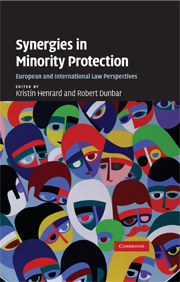Book contents
- Frontmatter
- Contents
- Foreword
- Abbreviations
- 1 Introduction
- PART A Minorities-specific instruments, provisions and institutions
- PART B Non-minorities-specific instruments, provisions and institutions
- 7 Developments relating to minorities in the law on genocide
- 8 The United Nations International Covenant on Economic, Social and Cultural Rights
- 9 The United Nations International Convention on the Elimination of All Forms of Racial Discrimination
- 10 The United Nations Convention on the Rights of the Child and Children Belonging to Minority Groups
- 11 UNESCO's Convention Against Discrimination in Education
- 12 A patchwork of ‘successful’ and ‘missed’ synergies in the jurisprudence of the ECHR
- 13 The many faces of minority policy in the European Union
- 14 Developments under the African Charter on Human and Peoples' Rights relevant to Minorities
- 15 Regional cooperation and minority issues in the Asia-Pacific region
- Index
- References
13 - The many faces of minority policy in the European Union
from PART B - Non-minorities-specific instruments, provisions and institutions
Published online by Cambridge University Press: 21 July 2009
- Frontmatter
- Contents
- Foreword
- Abbreviations
- 1 Introduction
- PART A Minorities-specific instruments, provisions and institutions
- PART B Non-minorities-specific instruments, provisions and institutions
- 7 Developments relating to minorities in the law on genocide
- 8 The United Nations International Covenant on Economic, Social and Cultural Rights
- 9 The United Nations International Convention on the Elimination of All Forms of Racial Discrimination
- 10 The United Nations Convention on the Rights of the Child and Children Belonging to Minority Groups
- 11 UNESCO's Convention Against Discrimination in Education
- 12 A patchwork of ‘successful’ and ‘missed’ synergies in the jurisprudence of the ECHR
- 13 The many faces of minority policy in the European Union
- 14 Developments under the African Charter on Human and Peoples' Rights relevant to Minorities
- 15 Regional cooperation and minority issues in the Asia-Pacific region
- Index
- References
Summary
Introduction: a fragmented regime
The European Union is an odd candidate for a role in the synergy of minority protection regimes, since it has never developed a self-conscious minority protection policy or adopted a legal instrument expressly aimed at protecting minority rights. Accordingly, its ‘synergetic potential’ has usually been depicted as passive: it took up minority protection standards from elsewhere (mainly those adopted in the framework of the Council of Europe and the Organization for Security and Co-operation in Europe (‘OSCE’)) and gave them its backing in the context of relations with countries seeking accession. In recent years, however, the European Union (‘EU’), as an increasingly all-purpose organisation, has started claiming a more active role, developing new approaches to minority protection which are both innovative and complementary to what is done elsewhere. This role has been acknowledged and is being examined systematically in the literature, even though the official legal instruments and policy documents of the EU itself have not, thus far, offered any comprehensive statement on the EU's position in this area.
For an entity with policies on practically everything, then, the EU has been slow to develop one in relation to minorities. Even the concept of ‘minority’, let alone ‘minority protection’ or ‘minority rights’, is absent from the EU and EC Treaties, and was included in the Constitutional Treaty (‘CT’) only after much haggling at the Intergovernmental Conference which followed the drafting Convention.
- Type
- Chapter
- Information
- Synergies in Minority ProtectionEuropean and International Law Perspectives, pp. 365 - 384Publisher: Cambridge University PressPrint publication year: 2009
References
- 2
- Cited by



